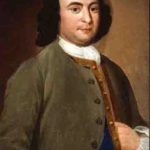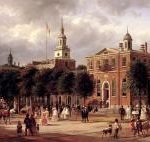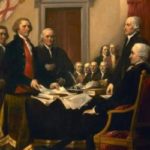After just six years under the Articles of Confederation, a committee of anxious delegates agreed to meet in Philadelphia to amend the government. The country was in an economic crisis — citizens couldn’t pay their debts, the government couldn’t really collect taxes, and rebellions were cropping up in states across the nation. The existing government had the potential to drive the country to ruin. So fifty-five men gathered to determine the shape of the new United States.
The document that emerged after that summer of debate was littered with masterful planning, strange ideas and unsavory concessions. The delegates decided they’d be pleased if this new government lasted fifty years. It has been our blueprint for over two centuries now. This is the story of how our Constitution came to be.
This short episode includes a one-page Graphic Organizer for students to take notes on while listening, as well as discussion questions on the back side.
Constitution Day Scavenger Hunt with 60-Second Civics
Fifty-five delegates attended the Constitutional Convention in Philadelphia in 1787. Most students can identify George Washington or James Madison. But what about the 53 other delegates? Who were they? How did they influence the convention? In this lesson, students will familiarize themselves with the delegates by listening to a series of 60-Second Civics podcast episodes devoted to the Framers of the Constitution.
The Constitutional Convention
In the summer of 1787, delegates gathered for a convention in Philadelphia, with the goal of revising the Articles of Confederation, the nation’s existing governing document, which wasn’t really working. Instead, they wrote a whole new document, which created a revolutionary form of government: the U.S. Constitution. Read more about the summer of 1787 in the National Constitution Center’s learning module.
“Father” of Our Country v. “Father” of the Bill of Rights
At the Constitutional Convention in Philadelphia, delegates analyzed, argued, and debated the new Constitution. George Mason, a Virginian, pleaded with the fifty-five delegates for the inclusion of a list of guaranteed rights. Mason (sometimes referred to as the “father of the Bill of Rights”) wanted the new Constitution to guarantee freedom of speech, press, and religion, and the right to a fair jury trial. He also wanted to include the freedom to vote.
Should the Electoral College Be Reformed?
This deliberation has students view C-SPAN video clips to learn about the history and Constitutional background of the Electoral College. Students will also explore arguments for and against reforming the Electoral College. Using this information, students will develop and argue their position on the question: Should the Electoral College Be Reformed?
The Influence of the Declaration of Independence on the Constitution
In this lesson, students will use C-SPAN video clips to examine the founding principles that emerged from the Constitutional Convention as well as hear about some of the people who participated. Students will use this information to analyze the role the compromise played in the creation of the Constitution.
The Constitutional Convention
In this lesson, students will use C-SPAN video clips to examine the founding principles that emerged from the Constitutional Convention as well as hear about some of the people who participated. Students will use this information to analyze the role the compromise played in the creation of the Constitution.
Act IV: How Did the Constitutional Convention Conclude?

This short video analyzes the final days of the Convention, when the delegates were eager to leave but also mindful of the work they had accomplished. They were “smart people who had learned from spending 88 days together” and even those opposed to the Constitution (Randolph, Mason, and Gerry) had the opportunity to dissent. Professor Gordon Lloyd agrees with Franklin that the Constitution did not achieve perfection but, rather, created a “more perfect union.”
Act II: What Was the Connecticut Compromise at the Constitutional Convention?

This short video explores the Connecticut Compromise, in which the delegates rejected an “either/or” solution to the question of representation and instead “thought out of the box,” creating a government that was partly national and partly federal. Professor Gordon Lloyd points out that although the final vote (5/4/1) on the Compromise did not reflect a bi-partisan consensus, it nevertheless was a significant breakthrough for moving on to other issues.
The Story of the Bill of Rights

This documentary tells the story of these individual freedoms that often are taken for granted today. But in 1787, when they were first discussed at the Constitutional Convention, the Founding Fathers rejected them. Why were these rights controversial then? The full story about these rights, including what they say and what they mean, is explained. Ten short videos examine each of the amendments in the Bill of Rights.